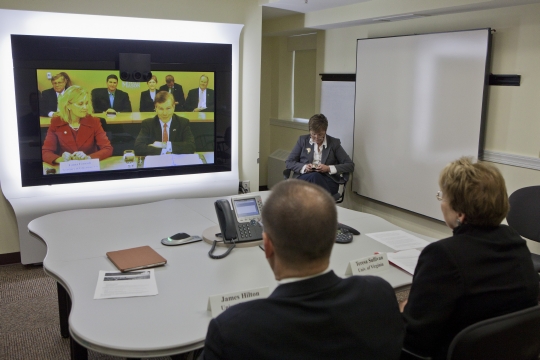A new partnership between the University of Virginia and Duke University will give students at both schools the chance to use advanced videoconferencing technology to learn a rare language they might not otherwise be able to study.
Starting in the fall, students at Duke will be able to enroll in a course on the Tibetan language offered in U.Va.’s College of Arts & Sciences, and U.Va. students will be able to take Duke’s course in Creole. Students will earn credit at their respective institutions.
The classes will be taught using Cisco’s TelePresence technology, which allows a group of students at the remote school to join the classroom in real time via video cameras and a large screen.
Both languages qualify as Less Commonly Taught Languages, or LCTLs, but are no less important for their scarcity, said Meredith Jung-En Woo, Buckner W. Clay Dean of Arts & Sciences.
“Languages are a profoundly important and integral part of the liberal arts education in the College,” Woo said. “It is through new languages that we gain the entree to other cultures. Esoteric as some of these cultures may appear, in studying them we also learn new truths about our culture and ourselves.”
For both schools, the exchange provides a way to offer instruction in languages that aren’t always available in an academic setting. In the future, the partnership could grow to include other universities and languages.
“We’re protecting languages that are very much a part of our global culture, but aren’t necessarily the first you would take in a western academic curriculum,” said Laurie Patton, dean of Duke’s Trinity College of Arts & Sciences. “We aren’t replacing the face-to-face teaching of more commonly taught languages. We are protecting these languages that, in this economic climate, might not be sustained.”
Equipping students to become productive global citizens is one of U.Va.’s primary institutional goals, and teaching a wide variety of languages is part of that effort, said U.Va.’s Cristina Della Coletta, associate dean of humanities and the arts in the College. However, teaching a variety of languages also creates a resource challenge.
“How can a single university offer even a small sampling of all the languages spoken in the world?” Della Coletta said. “Partnering with other institutions becomes a key component, and when Duke reached out to us this summer, Dean Woo and I thought this would be a phenomenal opportunity to exchange less commonly taught languages.”
The chance to learn Creole might appeal to U.Va. students already studying French or Haitian language and culture, as well as to those in fields such as nursing, global development or medicine who are planning to work in Haiti, where Creole is widely spoken. Though the course will be taught at Duke – which has Haiti Lab at the John Hope Franklin Humanities Institute – credit for U.Va. students comes from the French Department, chaired by associate professor Deborah McGrady.
“Using telepresence technology to cultivate a truly interdisciplinary dialogue among students from Duke and U.Va. that centers on mastering not only the language, but cultural knowledge of this vibrant Caribbean culture is what we think a truly global education looks like,” McGrady said.
Anne Kinney, a professor of Chinese who chairs the Department of East Asian Languages, Literatures and Cultures, said the University is equally excited to be able to offer Tibetan courses to a broader array of students. U.Va. is home to the Tibet Center, and study of the language and region is an institutional strength. Many students are drawn to Tibetan because of their engagement with Tibetan Buddhism, but there are also important practical reasons for studying the language, Kinney said.
“Students with facility in Tibetan language will become essential resources to our national security in negotiating the difficult relationship between China and Tibet, both politically and in terms of natural resources,” Kinney said.
The Cisco TelePresence technology is set up in two rooms on Grounds: one in Charles L. Brown Science & Engineering Library in Clark Hall and one in Clemons Library.
Media Contact
Article Information
March 18, 2013
/content/new-partnership-between-duke-uva-allows-students-learn-tibetan-creole

